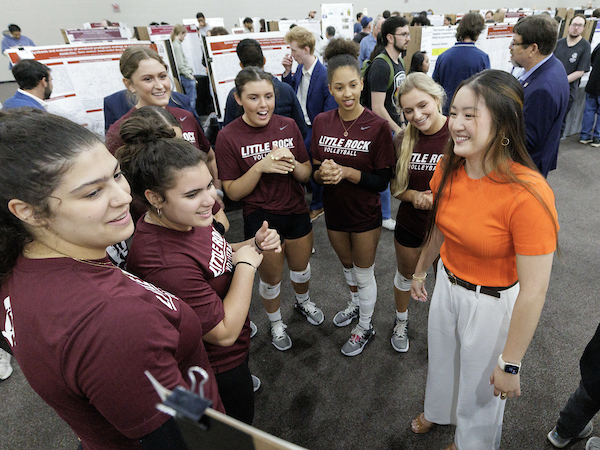Celebrating Student Ingenuity: Research Expo Showcases Diverse Student Research Projects

In a vibrant celebration of academic innovation and discovery, UA Little Rock hosted its annual Student Research and Creative Works Expo April 19 at the Jack Stephens Center, where the intellectual prowess and creativity of hundreds of students were on full display.
Livia Kimuria, a graduate student in applied communication, spoke about how she learned to cultivate a more positive and supportive environment for student-athletes using positive communication skills.
“I am a student-athlete, so I did this training with the volleyball team,” Kimuria said. “I focused on three components of positive communication, which are active listening, encouragement, and asking questions. I want the student-athletes to better communicate with each other so they can have a better experience.”
Courtney Wilson, a senior applied design major with an emphasis in ceramics, presented on the benefits of attending a winter residency at the Penland School of Craft in North Carolina.
“I focused on my Bachelor of Fine Arts thesis,” Wilson said. “It was a good time for me to evaluate my current body of work. I was very honored to be accepted. As far as I know. I was the only person in an undergraduate program to be doing a residency at that time. The residency is a good stepping stone for an up and coming artist.”
From groundbreaking scientific breakthroughs to insightful social analyses, the student research expo served as a testament to the diverse range of research endeavors undertaken by the university’s brightest minds. With presentations spanning across various disciplines, the event offered a glimpse into the cutting-edge research shaping the future of academia and beyond.
Selimhan Dagtas, who is earning a master’s degree in information science, presented a research poster on “Bias in YouTube Shorts Algorithm.” The research study explores bias in the algorithm for YouTube Shorts, suggesting that the algorithm prioritizes generic entertainment over informative videos or current events.
“These social media platforms are very prominent in our lives, and we wanted to see if there was a bias in their recommendations in one subject or the other. Once we look at the titles and descriptions, we saw that there was a significant decrease in negative morality and significant increase in positive emotions. The conclusion was that YouTube’s recommendation algorithm was biased and was trying to make people feel better about certain topics that include an international crisis.”
Tabitha Waite, a senior biology major, studied four western-lowland gorillas at the Little Rock Zoo to see if enrichment type impacted the amount of time gorillas spent foraging for food.
“This is important because zoos give enrichments all the time to their animals, and it mentally stimulates them and also is meant to elicit certain behaviors you would see in the wild,” Waite said. “For gorillas, a lot of what they do in the wild is called foraging. They look around for things to eat, which includes grass, leaves, and tree bark. We wanted to see if certain enrichments can improve the time they spend foraging.”
